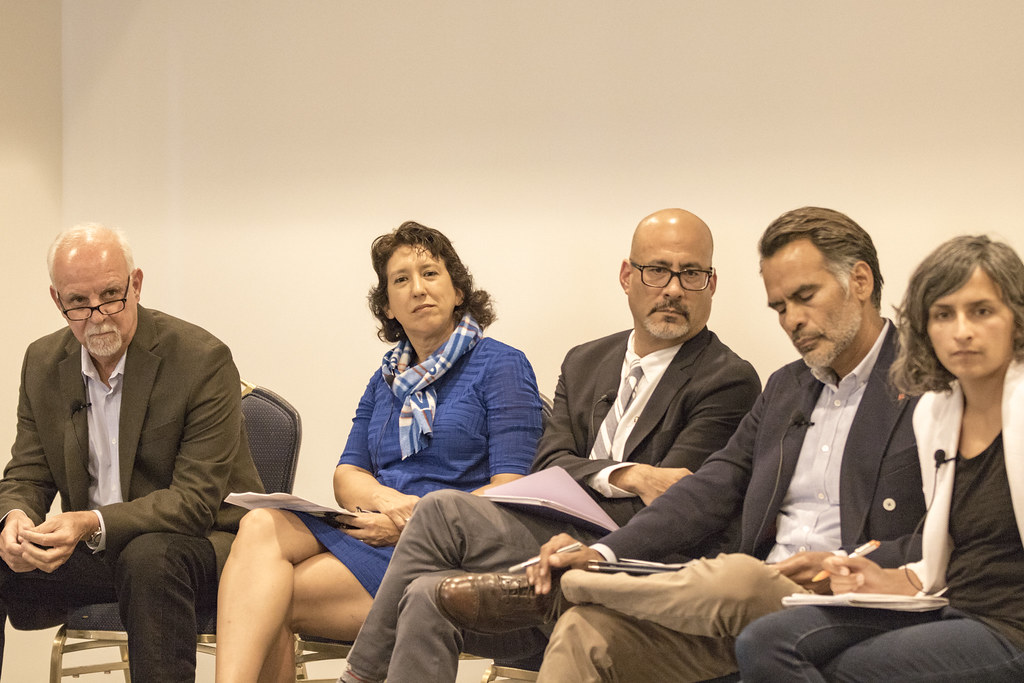By Cynthia Lee
Green power. Solar energy incentives. Renewable energy. Smart water systems. Planning for climate change. Clean tech in L.A. For the next three years, the UCLA Luskin Center for Innovation has set an ambitious goal to produce research that will help Los Angeles and state and federal agencies reach the Holy Grail of environmental sustainability.
Five Luskin scholars are working on initiatives that could change how residents, businesses, industries and government meet the challenge of living more sustainably. The Luskin center is carrying out a mission that was broadly outlined by Chancellor Gene Block in his inaugural address on May 13, 2008: to marshal the university’s intellectual resources campuswide and work toward intense civic engagement to solve vexing local and regional problems. “I believe that UCLA can have its greatest impact by focusing its expertise from across the campus to comprehensively address problems that plague Los Angeles,” the chancellor told an audience in Royce Hall.
With an agenda packed with six hefty research initiatives, the center is diving into that task under the leadership of its new director, J.R. DeShazo, an environmental economist and associate professor of public policy who also heads the Lewis Center for Regional Policy Studies. DeShazo took the reins in October when the center moved from the Chancellor’s Office to the School of Public Affairs, a move that took advantage of the school’s outward orientation. “It’s focused on policy solutions, so this is a natural place for us to grow,” DeShazo said. “But even though the center is located here, we’re very cross-disciplinary. We have researchers from chemistry, public health, engineering, the Anderson management school, the Institute of the Environment (IoE) and public policy.”
The five scholars working on the six initiatives are DeShazo; Yoram Cohen, an engineering professor and director of the Water Technology Research Center; Magali Delmas, professor of management and the IoE; Hilary Godwin, professor of environmental health sciences; and Matt Kahn, professor of economics in the departments of Economics and Public Policy and IoE. “We started off by identifying problems that our community is facing and that it can’t solve,” DeShazo said. Then, they asked two questions: “Does UCLA have the research capacity to address this deficit? And can we find a civic partner who can make use of this new knowledge?” Proposals were prioritized by a 16-member advisory board with a broad representation of business and nonprofit executives, elected officials and a media expert. Among the high-profile board members are State Senators Carol Liu and Fran Pavley; Mary Nichols, chairman of the California Air Resources Board; Los Angeles Council President Eric Garcetti and Controller Wendy Greuel; Assemblymember Mike Feuer; John Mack, chairman of the Police Commission; and William Ouchi, professor of the Anderson School and chairman of the Riordan Programs.
“We take our research ideas and develop real-world solutions that can be passed on to a civic partner with whom we can engage and support,” DeShazo said. “We let them carry through with the politics of policy reform as well as the implementation. We don’t get involved in advocacy.” An array of local green research DeShazo recently completed Luskin’s first initiative with his research on designing a solar energy program for L.A. that would minimize costs to ratepayers. His research – the basis of Mayor Antonio Villaraigosa’s new energy policy – proposes a solar feed-in tariff that would help everyone from homeowners and nonprofits to commercial property owners buy solar panels and be able to sell their solar energy to utility companies for a small profit.
Other Luskin research initiatives involve creating smart water systems for Southern California with water reclamation, treatment and reuse (UCLA researcher Cohen will work in partnership with the Metropolitan Water District); helping local governments plan for climate change (DeShazo with the California Air Resources Board and the Southern California Association of Governments); and reducing toxic exposures to nanomaterials in California (Godwin with the National Institute of Occupational Safety and Health.) In another initiative in partnership with the Mayor’s Office and the California Air Resources Board, researchers are compiling a database of jobs created by clean tech activities in L.A. County and will document best practices that other cities have used to attract and support clean tech development. Luskin’s Kahn is working with the Sacramento Municipal Utility District to pinpoint what determines how much electricity is used by residential and commercial consumers and how the district can market its major green energy programs to increase participation.
Finally, Delmas is looking into whether the Green Business Certification Program approved recently by the City Council will reduce the overall carbon footprint of small businesses. The program offers incentives and assistance to small business owners in L.A. to become more efficient and less wasteful in their everyday practices. Those businesses that meet certain “green” criteria will be certified as being environmentally friendly. Her partner in this venture is the Los Angeles Department of Water and Power.

